History of L'Shem Shomayim
A small number of itinerant Jews lived and traded in our region as early as the late 18th century, but not until roughly 1843 was Alexander Heyman of Wheeling, documented as settling permanently within the state of Virginia. By 1846, Wheeling apparently included a sufficient number of Jewish residents to hold High Holiday services, as reported in The Occident Jewish newspaper.
Overtime, several smaller congregations have with merged together with L’Shem Shomayim.
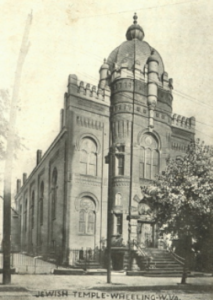
The first official Jewish organization in West Virginia was a Jewish burial society established in Wheeling in 1849 by a small group of German-Jewish immigrants. The group procured land for Jewish burials (what is now the lower part of Mt. Wood Cemetery), organized a burial society and shortly thereafter organized the first Jewish congregation in the state, Congregation L’ Shem Shomayim (For the Sake of Heaven).
The first annual meeting of the congregation was April 15, 1849. Between 1849-56 the congregation held services during the High Holy Days on the third floor of a house on the corner of Fourteenth (then Quincy) and Main Street. During this time a group of men organized a congregation in Bellaire, OH, known as the Sons of Israel.
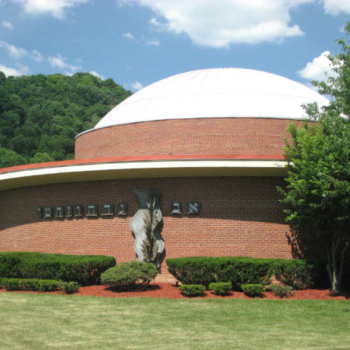
By 1861 L’ Shem Shomayim moved to Melodeon Hall on the east side of Main Street near Thirteenth Street. Beginning in 1865 through 1869 first steps were taken to establish L’ Shem Shomayim, as a Reform congregation. The Ladies Benevolent Society and
religious school were organized. Family pews were introduced, Dr. Einhorn’s prayer book supplemented the Orthodox prayer book, the organ and choir were introduced and black hats
were not worn in services.
By 1872, L’ Shem Shomayim moved to new quarters in the Hub Building at the corner of Market Street and Fourteenth Street. The congregation launched its first building fund in 1875. L’ Shem Shomayim moved to the Odd Fellow’s Hall (a Star of David can still be seen on the outside of the building) on the southwest corner of Twelfth and Chapline Streets and the Constitution and By-Laws were translated from German to English during 1877. Rabbi Vogelsdorf introduced sermons in English two years later.
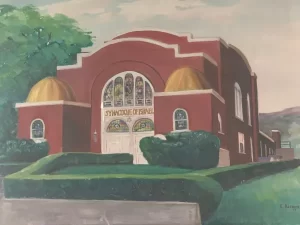
Because of good retail and merchant opportunities in Wheeling, the Jewish communit grew quickly. Family members from Europe and from other parts of the United States wer encouraged to settle in Wheeling by relatives already living in the state. As various industries especially coal mining, grew in West Virginia, opportunities for work and advancement primarily as merchants and retailers became plentiful and was the main reason that more Jews came to West Virginia, settling in a number of small towns and cities throughout the state.
By 1880, L’ Shem Shomayim had its first confirmation ceremony and during the next decade, the congregation voted to an erect a temple. Mt. Wood Cemetery, held in trust by the City of Wheeling since 1849, was transferred to the congregation. A building committee is appointed for the new temple, and the Ladies’ Hebrew Benevolent Society donated $2,100
(approximately $58,000 today) to the new building.
During the next decade 1890-1899, the Sons of Israel congregation in Bellaire splintered and Agudas Achim was formed. Contracts for the building of the new temple are in place to the build on east side Eoff Street between Twelfth and Thirteenth Streets in Wheeling. The Eoff Street Temple was dedicated with much community fanfare and celebration on April 8, 1892, followed by the congregation’s joining of the Union of American Hebrew Congregations in July. By the end of the decade the Union Prayer Book was introduced and the religious school library was founded.
The first half of the 20th Century brought with it new worship opportunities for the Jews
of Wheeling and Bellaire as the Jewish communities grew and changed. The Eoff Street Temple grew. In 1910 the religious school annex to the Temple was con-structed and dedicated.
The Sons of Israel Temple in Bellaire, a reform congregation, built a new building in 1911. Ohev Shalom, an Orthodox congregation in Wheeling was founded in 1913 in Wheeling by Henry Front, grandfather of Reform Rabbi Henri Front, and Aaron Marcus, father of Reform Rabbi Jacob Rader Marcus, founder of the American Jewish Archives.
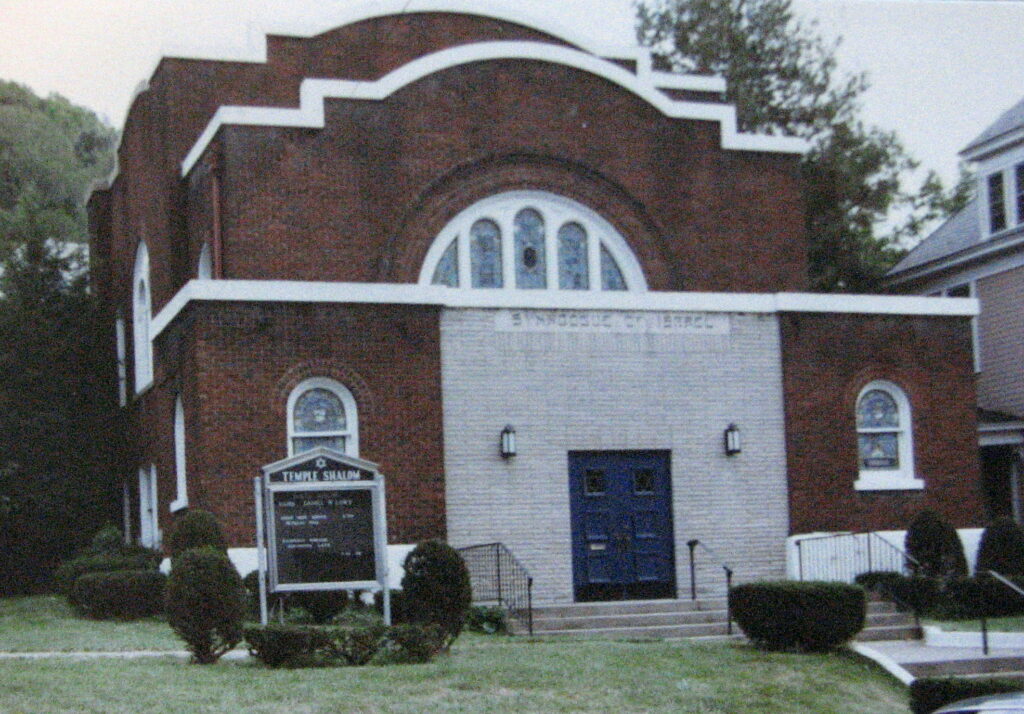
In 1915, newly ordained from Hebrew Union College in Cincinnati, Rabbi Abba Hillel Silver became the rabbi at the Eoff Street Temple. He remained in Wheeling for two years before accepting the pulpit at one of the largest congregations in Cleveland, Tifireth Israel Synagogue. Rabbi Silver returned to Wheeling in 1923 to marry Virginia Horkheimer.
In Bellaire Agudas Achim Synagogue moved to the Odd Fellows Hall in 1916 after meeting in member’s homes, then moved into a small wooden structure in 1923. The Hebrew Cemetery Association deeded Mt. Wood Cemetery owned by Congregation L’ Shem Shomayim to Ohev Shalom Congregation in 1919.
In 1926, the Synagogue of Israel was founded in the Woodsdale section of Wheeling, and by 1927 built a house of worship on Edgington Lane.
In 1931, Ohev Shalom Congregation moved to 1510 Market Street, and by 1940 Ohev Shalom Congregation disbanded and members joined the Synagogue of Israel.
In 1950, Agudas Achim finished construction of a new building on Belmont Street in Bellaire. The Sons of Israel Temple in Bellaire disbanded, sold its property and members joined the Eoff Street Temple in 1953. The next year, twelve men from the Synagogue of Israel purchased 10 acres of land to establish a new cemetery, Jewish Memorial Park on Middle Wheeling Creek Road.

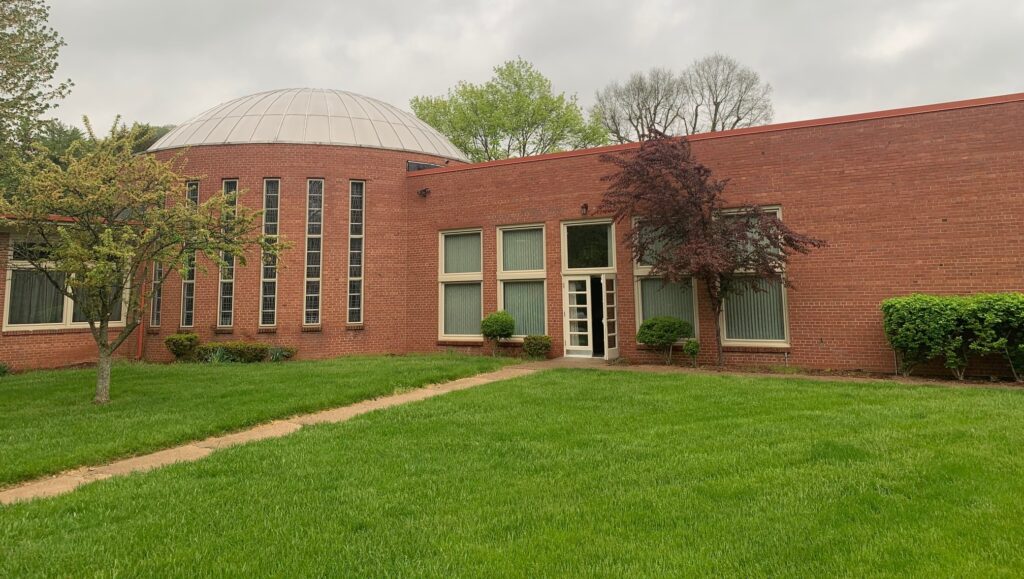
In 1955, members of the Eoff Street Temple broke ground at the corner of Rt. 88 (Bethany Pike) and Edgwood Street for a new temple building. The Woodsdale Temple was completed and dedicated in 1957. That same year the Synagogue of Israel started construction of a new library and educational wing, and remodeled the Sanctuary.
In 1968, Synagogue of Israel Sisterhood established the Next-to-New Shop on Twenty-ninth Street in Wheeling. That same year the Woodsdale Temple and Synagogue of Israel religious schools began the process of merging.
Merger talks began between the Woodsdale Temple and the Synagogue of Israel in 1971. By 1974, the two congregations merged creating Temple Shalom, designating the Bethany Pike building as the House of Worship and affiliating with the Union of American Hebrew Congregation. The following year, the Gates of Prayer replaced the Union Prayer Book as the official prayer book of Temple Shalom. In 1976, Daniel Lowy was hired as Rabbi at Temple Shalom. He remained the rabbi for 22 years before becoming the Rabbi Emeritus in 1998.
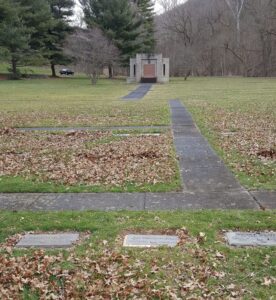
A major renovation took place at the Temple in 1980, establishing a dedicated library and moving the main entrance to the Temple to the back of the building off the parking lot. In 1982.
Mt. Wood Cemetery, a section of Greenwood Cemetery and Jewish Memorial Park were incorporated under the aegis of Temple Shalom. During 1983-84, the Temple Shalom Foundation was established, the new category of Associate membership was started, and the Temple Shalom religious school was a test site for new UAHC curriculum.
By 1986, AgudasAchim Congregation closed its doors, sold its building and its members joined Temple Shalom. The same year, United Jewish Federation incorporated under Temple Shalom auspices.
Congregation L’ Shem Shomayim celebrated its 140th Anniversary in 1989. Temple Shalom renovated the sanctuary and social hall after a capital campaign in 2000-2004. In 2012, the new Mishkan T’filah was integrated into services with the Gates of Prayer.
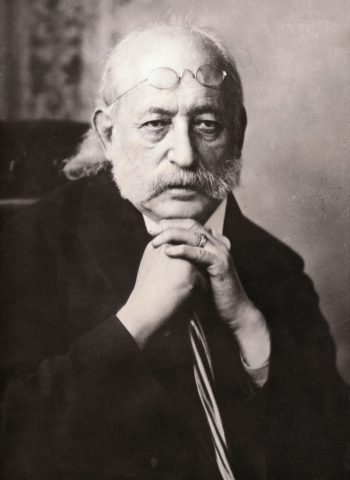
L’Shem Shomayim has seen its share of history.
Rabbi Isaac Mayer Wise, the architect of Reform Judaism in America, visited the Wheeling community in the 1850s and wrote about the experience.
Rabbi Abba Hillel Silver, one of the most influential American Zionists of the 20th century, began his rabbinate at the Eoff Street Temple.
Rabbi Jacob Rader Marcus, the father of American Jewish historical research and the founder of the American Jewish Archives in Cincinnati, grew up in Wheeling and was confirmed at the Eoff Street Temple.
Today, Temple Shalom is a small congregation, approximately 75 families, but it remains a vibrant community with an active religious school and adult education program. Its members routinely reach out to the Greater Wheeling community of which they are an integral part, and the Shabbat services and Saturday Torah study are always well attended for the size of the community.

In 2017, Temple Shalom welcomed home Rabbi Joshua B. Lief to lead the congregation. Confirmed at Temple Shalom, Rabbi Lief is one of very few of rabbis who return to their home congregation as rabbi.
In 2023, Temple Shalom is vibrant and active. As a congregation we honor our heritage, looking to the future by fulfilling our legacy of worship, education and community involvement.